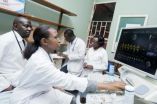(Press-News.org) ANN ARBOR—Imagine you're fighting for your life but no matter how hard you hit, your opponent won't go down.
The same can be said of highly treatment-resistant cancers, such as head and neck cancer, where during radiation and chemotherapy some cancer cells repair themselves, survive and thrive. Head and neck cancer is the sixth most common cancer in the world, but the late detection and treatment resistance result in a high mortality rate.
Now, University of Michigan researchers have found that a particular protein—TRIP13—encourages those cancer cells to repair themselves. And they have identified an existing chemical that blocks this mechanism for cell repair.
"This is a very significant advance, because identifying the function of the protein that fuels the repair of cancer cells and having an existing chemical that blocks the process, could speed the process of moving to clinical trials," said principal investigator Nisha D'Silva, U-M professor of dentistry and associate professor of pathology.
Typically, if scientists discover a promising drug therapy target, it takes years to develop drug compounds from scratch and move these into clinical trials.
If cell DNA is damaged and the cell cannot repair the damage, the cell dies. In head and neck cancers, D'Silva and colleagues showed that cancer cells that overexpress TRIP13 were able to repair their DNA enough to survive and continue to grow as cancer.
"Targeting this repair mechanism with specific drugs could increase effectiveness of treatment and improve survival of cancer patients," D'Silva said. "And given the overexpression of TRIP13 in several treatment-resistant cancers, this strategy will likely be important for multiple cancers."
INFORMATION:
The study, "TRIP13 promotes error-prone nonhomologous end joining and induces chemoresistance in head and neck cancer," is scheduled to appear online July 31 in Nature Communications. Rajat Banerjee of the U-M School of Dentistry is first author.
Nisha D'Silva: http://bit.ly/1tpn4sg
U-M School of Dentistry: http://www.dent.umich.edu
U-M researchers find protein that fuels repair of treatment-resistant cancer cells
2014-07-31
ELSE PRESS RELEASES FROM THIS DATE:
Boat noise impacts development and survival of sea hares
2014-07-31
While previous studies have shown that marine noise can affect animal movement and communication, with unknown ecological consequences, scientists from the Universities of Bristol and Exeter and the École Pratique des Hautes Études (EPHE) CRIOBE in France have demonstrated that boat noise stops embryonic development and increases larval mortality in sea hares.
Sea hares, (specifically the sea slug Stylocheilus striatus used in this study) usually hatch from their eggs to swim away and later feed on toxic alga but this study, conducted in a coral reef lagoon in French ...
New international tree nut council study looks at nuts, diabetes and metabolic syndrome
2014-07-31
Two new meta-analyses involving tree nuts (almonds, Brazil nuts, cashews, hazelnuts, macadamias, pecans, pine nuts, pistachios and walnuts) were recently published in the online publications, British Medical Journal Open (BMJ Open) (i) and PLOS ONE (ii). The BMJ Open article looked at the effects of tree nuts on metabolic syndrome (MetS) criteria and showed that tree nut consumption resulted in a significant decrease in triglycerides and fasting blood glucose. The PLOS ONE article focused on the effect of tree nuts on glycemic control in diabetes and showed significant ...
Vets' alcohol problems linked to stress on the home front
2014-07-31
VIDEO:
Research findings show the important role civilian life and the accompanying stress plays in cases of alcohol use disorder among returning National Guardsmen.
Click here for more information.
Regardless of traumatic events experienced during deployment, returning National Guard soldiers were more likely to develop a drinking problem if faced with civilian life setbacks, including job loss, legal problems, divorce, and serious financial and legal problems—all commonplace ...
Veterans' alcohol problems linked to stress on the home front
2014-07-31
Ann Arbor, MI, July 31, 2014 — Regardless of traumatic events experienced during deployment, returning National Guard soldiers were more likely to develop a drinking problem if faced with civilian life setbacks, including job loss, legal problems, divorce, and serious financial and legal problems — all commonplace in military families. Results of the study by researchers at Columbia University's Mailman School of Public Health are published online in the American Journal of Preventive Medicine.
Alcohol abuse is a major concern for reservists returning home. Nearly 7% ...
Research proves there is power in numbers to reduce electricity bills
2014-07-31
Consumers can save money on their electricity bills and negotiate better deals by joining forces with similar groups of customers to switch energy suppliers according to new research.
Collective switching or group buying schemes, where thousands of consumers join forces to negotiate cheaper electricity tariffs, are becoming more popular in the UK as bills continue to rise putting increasing pressure on household budgets. Initiatives like Which?'s Big Switch, People Power or the Big Deal have helped thousands of consumers to save, on average, up to a third of their yearly ...
Engineering a protein to prevent brain damage from toxic agents
2014-07-31
Research at New York University is paving the way for a breakthrough that may prevent brain damage in civilians and military troops exposed to poisonous chemicals—particularly those in pesticides and chemical weapons.
An article in the current issue of the journal ChemBioChem outlines the advancement in detoxifying organophosphates, which are compounds commonly used in pesticides and warfare agents. The patent-pending process was developed by NYU School of Engineering Associate Professor of Chemical and Biological Engineering Jin Kim Montclare, along with Richard Bonneau, ...
Transplantation shown to be highly effective in treating immune deficiency in children
2014-07-31
Babies who are born with severe combined immunodeficiency (SCID) can be successfully treated with a transplant of blood-forming stem cells, according to experts led by Memorial Sloan Kettering's Richard J. O'Reilly, MD, a world-renowned pioneer in the development of transplant protocols. Their review will be published in the July 30 issue of the New England Journal of Medicine.
SCID is a group of inherited disorders that cause the immune system to severely malfunction. When this breakdown occurs, babies no longer have the ability to fight off routine infections because ...
Journal supplement details progress in African medical education
2014-07-31
Medical education in sub-Saharan Africa is being revitalized and expanded through a U.S.-funded effort that is dramatically increasing enrollment, broadening curricula, upgrading Internet access and providing cutting-edge skills labs and other technologies.
In the first substantial publication by participants of the $130 million Medical Education Partnership Initiative (MEPI), more than 225 authors detailed progress being made at the African institutions. Their reports are in a supplement being published today by the journal Academic Medicine. Begun in 2010, MEPI is ...
Resistance to key malaria drug spreading at alarming rate in Southeast Asia
2014-07-31
WHAT:
Resistance to artemisinin, the main drug to treat malaria, is now widespread throughout Southeast Asia, among the Plasmodium falciparum (P. falciparum) parasites that cause the disease and is likely caused by a genetic mutation in the parasites. However, a six-day course of artemisinin-based combination therapy—as opposed to a standard three-day course—has proved highly effective in treating drug-resistant malaria cases, according to findings published today in the New England Journal of Medicine. The research was conducted by an international team of scientists ...
Biologists describe mechanism promoting multiple DNA mutations
2014-07-30
DNA mutations—long known to fuel cancer as well as evolutionary changes in a living organism—had been thought to be rare events that occur randomly throughout the genome.
However, recent studies have shown that cancer development frequently involves the formation of multiple mutations that arise simultaneously and in close proximity to each other. These groups of clustered mutations are frequently found in regions where chromosomal rearrangements take place.
The discovery, published in the journal Cell Reports, may one day lead to new cancer therapies, according to ...

